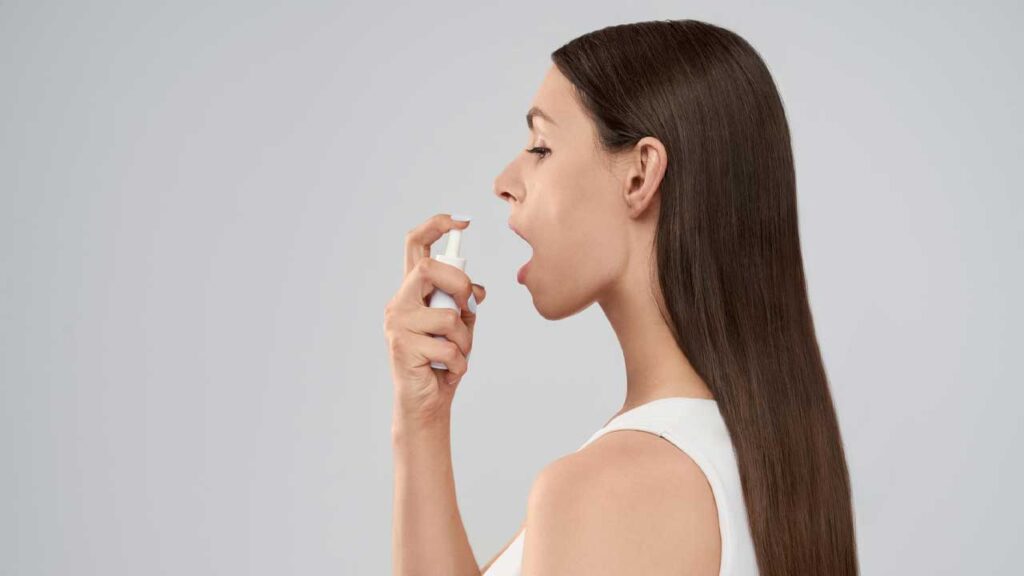Experiencing a dry mouth isn’t just about that uncomfortable sensation of thirst; it can hint at deeper health concerns and even lead to severe dental problems. Many turn to dry mouth sprays for relief. This guide aims to explore these sprays in depth, explaining their mechanism and the numerous benefits they offer.
Understanding Dry Mouth
Definition and symptoms of dry mouth

Dry mouth, medically termed as xerostomia, is the condition where the salivary glands in our mouth don’t produce enough saliva to maintain a moist environment. It’s more than just feeling parched; it’s a state that can be both bothersome and detrimental.
Symptoms to watch out for
While dry mouth might seem straightforward, there are several symptoms indicating its presence:
- The mouth often feels sticky and parched.
- There’s a recurring sensation of thirst.
- One might notice sores or split skin, especially at the mouth’s corners.
- The throat might feel desiccated, accompanied by cracked lips.
- A distinct burning or tingling sensation, particularly on the tongue, can be a telltale sign.
Delving into the causes of oral dryness
A sporadic dry mouth feeling might not ring alarm bells, but if it’s a consistent experience, it’s essential to understand its root causes.
Factors leading to dry mouth
Several reasons might be behind that persistent dry feeling in the mouth:
- There are numerous medications with side effects leading to dry mouth.
- Specific medical conditions, like Sjögren’s Syndrome, directly result in xerostomia.
- Therapeutic treatments, such as radiation, especially targeted at the head and neck, can diminish saliva production.
- Some chemotherapy drugs can alter saliva’s nature, reducing its quantity.
- Experiencing nerve damage, especially in the head and neck region, can also lead to dry mouth.
The repercussions on oral health
A dry mouth isn’t just an inconvenience. The lack of adequate saliva production has direct implications for oral health.
Saliva: More than just water
Saliva isn’t merely a liquid in our mouth; it serves several critical functions:
- It acts as a natural neutralizer against acids produced by bacteria, thereby preventing tooth decay.
- It ensures limited bacterial growth, keeping oral infections at bay.
- A well-lubricated mouth ensures food particles don’t stick around, maintaining oral hygiene.
- Bad breath is often kept in check by consistent saliva production.
- A moist mouth enhances our taste buds’ functioning, making food enjoyable.
- Saliva also aids in speech, preventing voice and throat issues.
How Dry Mouth Spray Works
A dry mouth spray isn’t just any regular spray; it’s meticulously designed to replicate the mouth’s natural moisture. Let’s decode the science behind it.
Mechanism of action
Dry mouth sprays are formulated to mimic natural saliva. The primary aim is to provide immediate moisture and relief, but they also have properties that ensure prolonged hydration and protection.
Understanding Artificial Saliva
Artificial saliva, the primary component in many dry mouth sprays, isn’t just about wetting the mouth. It has a composition designed to offer protection, hydration, and relief, much like our natural saliva.
The role of mouth spray ingredients
Every ingredient in a dry mouth spray plays a crucial role. Some ingredients focus on immediate relief, while others ensure the mouth stays moistened for an extended period.
Key Ingredients in Dry Mouth Sprays and Their Functions
| Ingredient | Function |
| Carboxymethyl cellulose | Acts as a thickening agent, replicating the consistency of natural saliva |
| Xylitol | Helps prevent tooth decay and promotes saliva production |
| Glycerin | Provides prolonged moisture to the oral tissues |
| Aloe Vera | Offers a soothing effect on irritated oral tissues |
| Calcium and fluoride | Helps strengthen teeth and prevent cavities |
Benefits of Using Dry Mouth Spray
Using a dry mouth spray doesn’t just alleviate the discomfort of a parched mouth. There are numerous benefits tied to its usage.
Instant Relief
The most immediate benefit, and the reason most people turn to dry mouth sprays, is the instant relief they offer. Just a few spritzes, and the mouth feels significantly more hydrated and comfortable.
Maintenance of pH Balance
A balanced pH is vital for oral health, and dry mouth sprays help maintain this balance, ensuring the mouth isn’t too acidic or too alkaline.
Preventing Tooth Decay
Saliva acts as a protective barrier for teeth, preventing cavities and tooth decay. Dry mouth sprays, especially those with ingredients like xylitol, offer similar protection.
Choosing the Right Dry Mouth Spray
With a plethora of options available in the market, selecting the ideal dry mouth spray can be daunting. However, understanding certain factors can ease the decision-making process.
Factors to Consider
Ingredients List
Always check the ingredients before buying a dry mouth spray. Opt for sprays that have natural ingredients and avoid those with harsh chemicals or alcohol that can exacerbate dryness.
Duration of Relief
Some sprays offer temporary relief, while others promise extended moisture. Depending on your needs – whether you require something for quick relief or lasting protection – choose accordingly.
Flavor
For those sensitive to tastes or have specific preferences, the flavor of the spray can be a determining factor. There are multiple flavor options available, from unflavored to minty fresh.
Brand Reputation
Opt for brands with good reviews and a solid reputation. A company with a history of providing quality oral care products is often a safer bet.
Ease of Use
Check the spray mechanism. It should be easy to use, especially if you’re on-the-go or need frequent applications.
Dry Mouth Spray and Its Alternatives
While dry mouth sprays are a popular choice, there are alternative products available that cater to the same need.
Dry Mouth Remedies and Their Features
| Remedy | Features |
| Dry Mouth Gels | – Longer-lasting compared to sprays<br>- Good for overnight use |
| Lozenges & Tablets | – Stimulate saliva production<br>- Convenient to carry and consume |
| Mouthwashes | – Address bad breath and dryness<br>- Some contain enzymes mimicking saliva |
| Saliva Stimulants | – Medications that boost saliva production<br>- Require a doctor’s prescription |
Benefits of a Moistened Mouth
Maintaining a moist mouth goes beyond comfort; it’s a crucial aspect of oral health and overall well-being.
Preventing Oral Issues
Combating Bad Breath
A dry mouth can lead to bad breath, as food particles remain and bacteria flourish. Using dry mouth sprays can help in reducing this issue significantly.
Reducing Gum Diseases
A moist mouth prevents the accumulation of plaque, reducing the risk of gum diseases like gingivitis.
Staving off Mouth Sores
A hydrated oral environment lessens the chances of mouth sores and infections, offering a protective shield.
Enhanced Quality of Life
Improved Taste and Digestion
Saliva aids in tasting and digesting food. By ensuring the mouth is moistened, one can enjoy flavors better and aid the digestion process.
Better Speech and Comfort
A dry mouth can impede speech and cause discomfort. Keeping it hydrated ensures smooth conversations without hindrance.
Potential Side Effects of Dry Mouth Sprays
While dry mouth sprays are generally safe and effective, it’s essential to be aware of potential side effects and what to expect.
Common Side Effects
Allergic Reactions
Some individuals might be allergic to certain ingredients in the spray. Symptoms can include itching, rash, or swelling in the mouth.
Altered Taste
Some sprays can leave an unusual taste in the mouth, though this typically subsides after a short duration.
Sticky Mouth Feel
Certain sprays can leave a slightly sticky residue. This isn’t harmful but can be a tad unpleasant for some users.
Minimizing Side Effects
Patch Test
Before using the spray extensively, consider doing a patch test. Spray a small amount and wait for a few hours to see if any allergic reactions develop.
Consultation with a Dentist
If you’re unsure about which product to choose or if you have specific medical conditions, consult with a dental professional. They can guide you to a product that’s most suitable for your needs.
Reading Instructions
Always read the instructions and usage guidelines provided on the product. This ensures you’re using the product correctly and reduces the risk of potential side effects.
FAQs About Dry Mouth Sprays
For those new to the world of dry mouth sprays or those looking for more clarity, here’s a roundup of frequently asked questions.
1. How often should I use dry mouth spray?
It varies based on individual needs and the product’s formulation. Some might need multiple applications throughout the day, while others might find relief with just one or two spritzes. Always follow the product’s guidelines.
2. Are there any ingredients to avoid in dry mouth sprays?
It’s advisable to avoid sprays containing alcohol or harsh chemicals, as they can worsen the dryness. Look for natural and hydrating ingredients.
3. Can children use dry mouth sprays?
Most sprays are safe for children, but it’s recommended to consult with a pediatric dentist before introducing any oral care products.
4. Are dry mouth sprays the only solution for xerostomia?
No, they’re one of many solutions available. There are gels, lozenges, and even specific medications to tackle dry mouth.
5. Can I use dry mouth spray before going to bed?
Yes, many find relief by using the spray before bedtime, especially if nighttime dryness is a concern. However, ensure the product doesn’t leave a heavy residue that might be uncomfortable during sleep.
Dry mouth, or xerostomia, isn’t just a fleeting discomfort. It’s a condition that can impact oral health and overall quality of life. Thankfully, solutions like dry mouth sprays are readily available. By understanding their benefits, working mechanism, and potential side effects, one can make an informed choice, ensuring a hydrated, healthy mouth.


2 thoughts on “A Guide to Dry Mouth Spray: How It Works and Its Benefits”